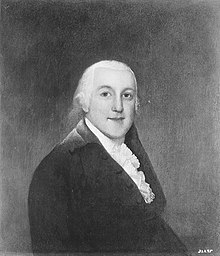
Back إدوارد راتليدج Arabic ادوارد راتليدج ARZ ادوارد روتلدج AZB Edward Rutledge Catalan Edward Rutledge (politik) Czech Edward Rutledge German Edward Rutledge French אדוארד ראטלדג' HE Edward Rutledge Italian エドワード・ラトリッジ Japanese
Edward Rutledge | |
|---|---|
 1791 oil painting of Rutledge by Charles Earl | |
| 39th Governor of South Carolina | |
| In office December 18, 1798 – January 23, 1800 | |
| Lieutenant | John Drayton |
| Preceded by | Charles Pinckney |
| Succeeded by | John Drayton |
| Delegate from South Carolina to the Continental Congress | |
| In office 1774 – 1776 | |
| Member of the South Carolina Senate from Charleston | |
| In office November 28, 1796 – December 6, 1798 | |
| Member of the South Carolina House of Representatives from Charleston | |
| In office January 6, 1783 – November 28, 1796 | |
| In office March 26, 1776 – October 17, 1778 | |
| Personal details | |
| Born | November 23, 1749 Charleston, South Carolina, British America |
| Died | January 23, 1800 (aged 50) Charleston, South Carolina, U.S. |
| Resting place | Saint Philip's Episcopal Church Cemetery, Charleston |
| Political party | Federalist |
| Spouse(s) |
Henrietta Middleton
(m. 1774; died 1792)Mary Shubrick Eveleigh[citation needed] |
| Relatives | John Rutledge (brother) |
| Signature | |
| Military service | |
| Allegiance | |
| Branch/service | South Carolina militia |
| Years of service | 1778–1781 |
| Rank | Captain |
| Battles/wars | American Revolutionary War |
Edward Rutledge (November 23, 1749 – January 23, 1800) was an American Founding Father and politician who signed the Continental Association and was the youngest signatory of the Declaration of Independence. He later served as the 39th governor of South Carolina.